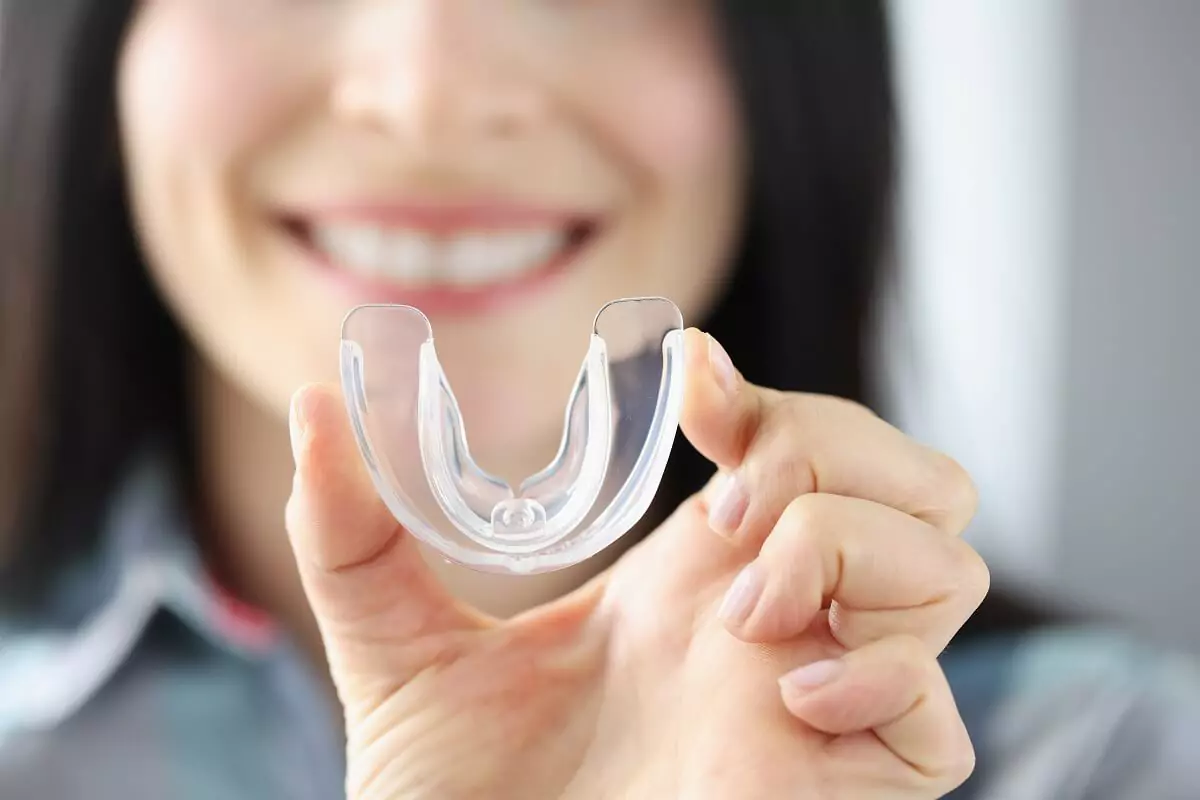Last Updated on: 24th December 2025, 07:22 am
The best mouthguard for teeth grinding depends on your needs. Custom-made mouthguards by your dentist are the most recommended for their perfect fit and comfort, but boil-and-bite mouthguards are also a good choice if you want something affordable and adaptable at home.
Have you ever woken up with a tight, painful jaw? Or has anyone told you that you grind your teeth while sleeping? If so, you might be suffering from bruxism.
Bruxism is an unconscious habit where you grind or clench your teeth that affects between 8% and 31% of people worldwide. Besides jaw pain, it can cause worn teeth, sensitivity, headaches, and sleep problems.
Mouthguards for teeth grinding are the main tool to protect your teeth and reduce discomfort. In this article, you’ll learn what they are, how they work, how to use them properly, and how to choose the best model for you in 2025.
What are mouthguards for teeth grinding?
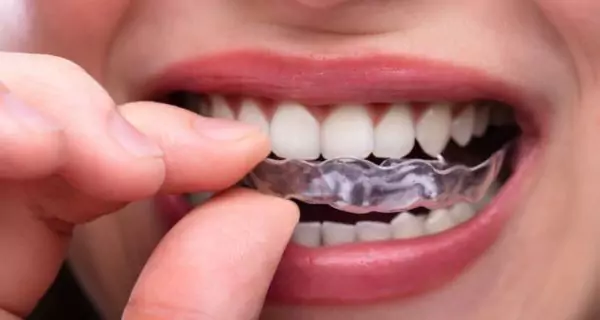
Also called dental splints or night guards, these devices are designed to cover your teeth while you sleep, creating a barrier between your upper and lower teeth.
Their main function is not to stop bruxism, but to prevent tooth damage by absorbing the grinding forces.
What types of mouthguards exist?
Standard (stock) mouthguards
- pre-made and ready to use
- cheapest option but with minimal fit and comfort
Boil-and-bite mouthguards
- softened in hot water and molded by biting at home
- better fit than standard, still affordable
Custom mouthguards
- made to measure by your dentist or with home impression kits
- offer the best fit, comfort, and effectiveness but are more expensive and take longer to get.
How do mouthguards for teeth grinding work?
They distribute the force of clenching evenly, protecting your teeth and jaw joints. Acting as a soft barrier, they absorb pressure and prevent your upper and lower teeth from grinding together.
Some guards also help relax your chewing muscles, reducing tension in the jaw, neck, and head for a more restful sleep.
What are the benefits of using mouthguards for teeth grinding?

Mouthguards for teeth grinding have many benefits.
How do mouthguards protect your teeth from damage?
Mouthguards act like shock absorbers between your teeth, preventing:
- tooth fractures
- enamel erosion
- sensitivity caused by constant grinding or clenching
They create a safe barrier that keeps your teeth strong and healthy.
Can mouthguards reduce jaw and facial pain?
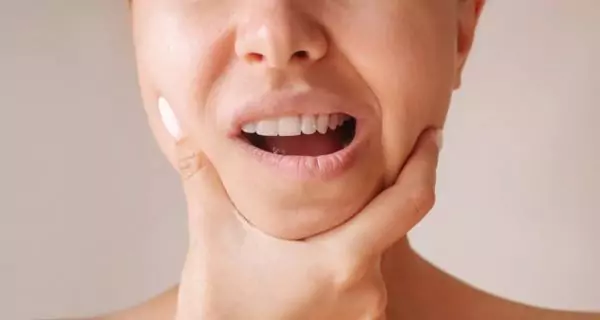
Yes, by distributing the pressure from clenching or grinding, mouthguards:
- lower muscle tension in your jaw and face
- relieve TMJ (jaw joint) pain
- reduce the frequency of headaches related to bruxism
You should feel more relaxed and comfortable throughout the day.
Do mouthguards improve sleep quality?
Definitely, by stopping grinding noises and reducing discomfort, many people experience:
- a deeper and more restful sleep
- fewer nighttime awakenings
- better energy and mood during the day
Are mouthguards comfortable?
Yes, with different options, from stock to custom-made, you can find one that:
- fits your bite well
- feels comfortable all night
- encourages you to use it consistently for better results
Do mouthguards help save money in the long run?
Yes they do. A good mouthguard prevents expensive dental treatments caused by:
- severe tooth wear
- cracks or fractures
- TMJ disorders
This means significant savings in dental care over time.
How to use mouthguards for teeth grinding effectively?
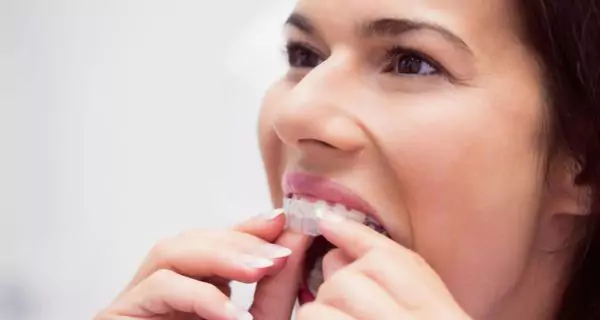
Using a mouthguard is easy, but taking care of it is very important. A good cleaning keeps it comfortable, effective, and longer lasting.
Here’s how to use and care for it every day:
1. Wear it every night
Wear your mouthguard every night or as your dentist recommends. This routine protects your teeth and keeps your guard working optimally.
2. Make sure it fits just right
- Boil‑and‑bite mouthguards: heat them and bite down as directed so they mold to your teeth.
- Custom mouthguards: ensure they fit snugly when first used; if not, consult your dentist.
3. Clean it right after using
- Rinse it with cool or lukewarm water as soon as you take it out. This will remove saliva and debris.
- Brush it gently using a soft-bristle brush dedicated only to your mouthguard (don’t use your regular toothbrush). Use mild hand soap, not toothpaste.
Avoid toothpaste to clean your mouthguard; it is too abrasive and can scratch the plastic, causing stains and allowing bacteria to stick and grow over time.
4. Dry it before storing
- Let it air-dry on a clean towel for 15–30 minutes.
- Once dry, store it in a ventilated, rigid case away from heat or damp environments.
5. Deep clean weekly or biweekly
There are options like:
- Vinegar + hydrogen peroxide soak: soak in white vinegar for 30 minutes, rinse well, then soak in hydrogen peroxide for another 30 minutes. Rinse again and air-dry completely.
- Denture cleaner tablets: dissolve in water and soak for about 10–15 minutes, then rinse and dry.
Avoid: bleach, mouthwash with alcohol, hot water, or overly long soaks; these can warp or damage the guard.
6. Clean the case, too
Wash your case every few days with mild soap, rinse well, and let it air-dry. A clean guard in a dirty case is useless.
7. Inspect and replace regularly
- Check for cracks, holes, warping, discoloration, or fading fit.
- Replace OTC guards every 3–6 months; custom guards can last a few years with good care.
8. Bring it to dental checkups
Take your mouthguard to dental appointments so your dentist can inspect and deep clean it. This will catch wear issues early and support your oral health.
A simple routine, like wearing it nightly, rinsing, brushing lightly, air-drying, deep-clean weekly, and with regular inspections, will keep your mouthguard clean, effective, and long-lasting. When in doubt, ask your dentist; they’re your partner in protecting your smile.
Which are the best mouthguards for teeth grinding in 2025?
Here are the top recommended mouthguards for teeth grinding this year, based on expert reviews, studies, and user experiences.
1. DenTek Professional-Fit Night Guard
It is a boil-and-bite guard for upper teeth.
How to mold
- Dip in hot water for 45 seconds.
- Place in your mouth and bite for 2 minutes.
- Rinse with cold water to set.
You can repeat molding if needed.
Pros
- easy to mold with hot water
- clear, simple instructions
- great value for price
- firm and comfortable fit for most
- protects like a professional splint
Cons
- Some find it too big or bulky.
Practical, affordable, and effective for mild bruxism if you need a quick, accessible night guard. For a thinner or more precise fit, consider a custom model.
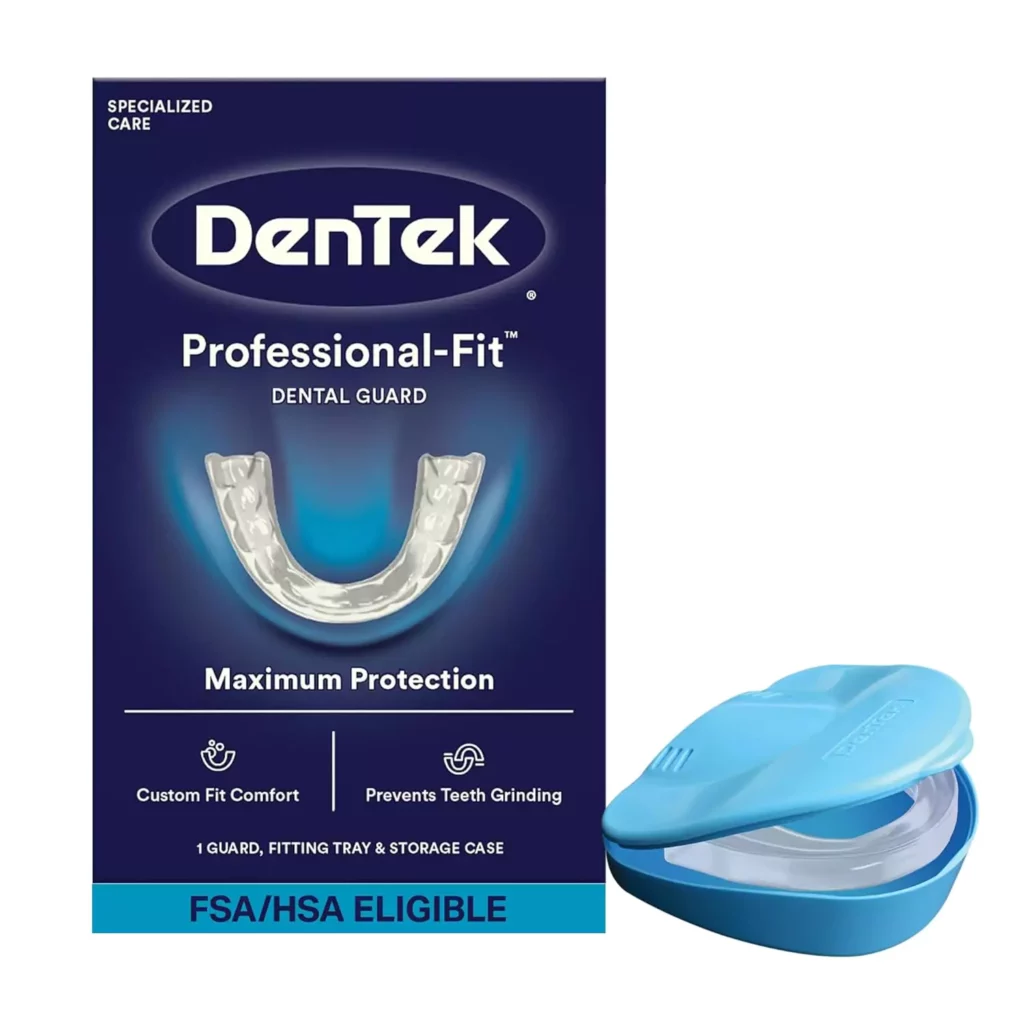
DenTek Professional-Fit Dental Guard fits the front and back teeth and offers custom-fit protection similar to a professionally made mouth guard – for a fraction of the cost.
2. Oral-B Nighttime Dental Guard
It is a boil-and-bite guard moldable in the microwave, with a minty fresh taste.
How to mold
- Place in the included microwave-safe case with water.
- Heat per instructions (~1 min).
- Bite down for 2 min.
- Rinse with cold water to set.
It is re-moldable if needed.
Pros
- very quick and easy to prepare
- includes microwave-safe case
- light mint flavor for freshness
- comfortable fit for most
- Trusted, well-known brand
Cons
- Some say it feels bulky
- May develop cracks or wear over time
It is ideal if you want a fast, comfortable guard with a fresh feel. For a thinner or fully custom fit, explore other options.
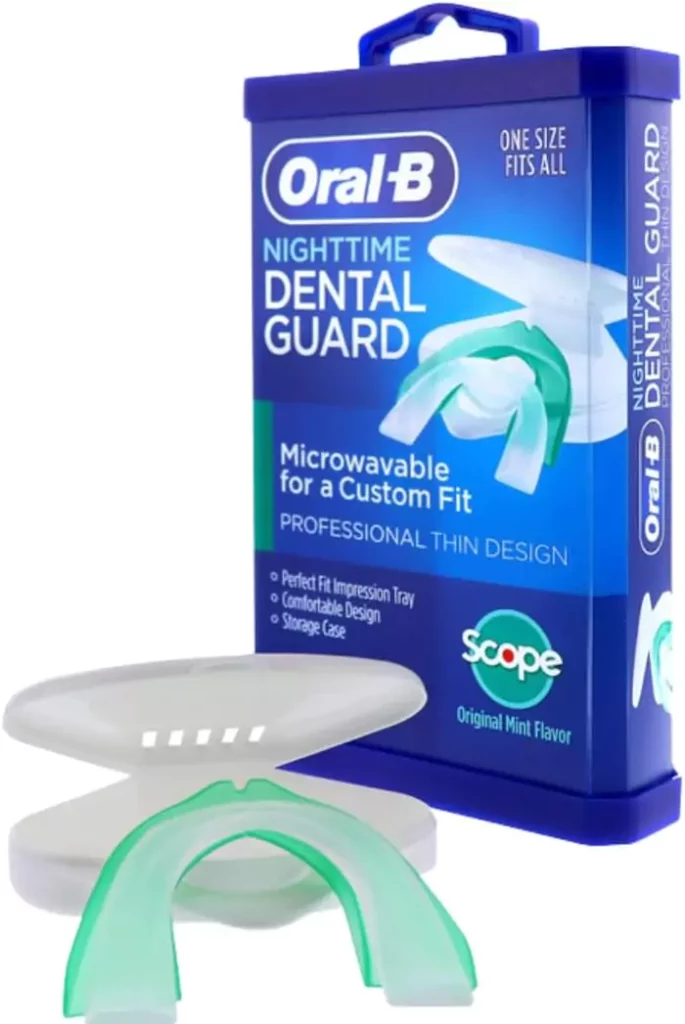
The Oral-B Nighttime Dental Guard is an over-the-counter moldable mouth guard that protects against symptoms of bruxism, including nighttime jaw clenching and grinding of the teeth.
3. Plackers Grind No More
It is a disposable, ready-to-use mouthguard. No molding is required.
How to use
- Remove from packaging.
- Place directly on your teeth as directed.
- Use nightly and replace as needed.
Pros
- no molding needed; ready to use
- very practical for travel or emergencies
- thin and comfortable for most
- BPA-free and safe
Cons
- genericfit; not customized
- not for severe bruxism
It is a quick, practical solution for mild bruxism or travel use. Does not offer the same protection or comfort as molded or custom models.
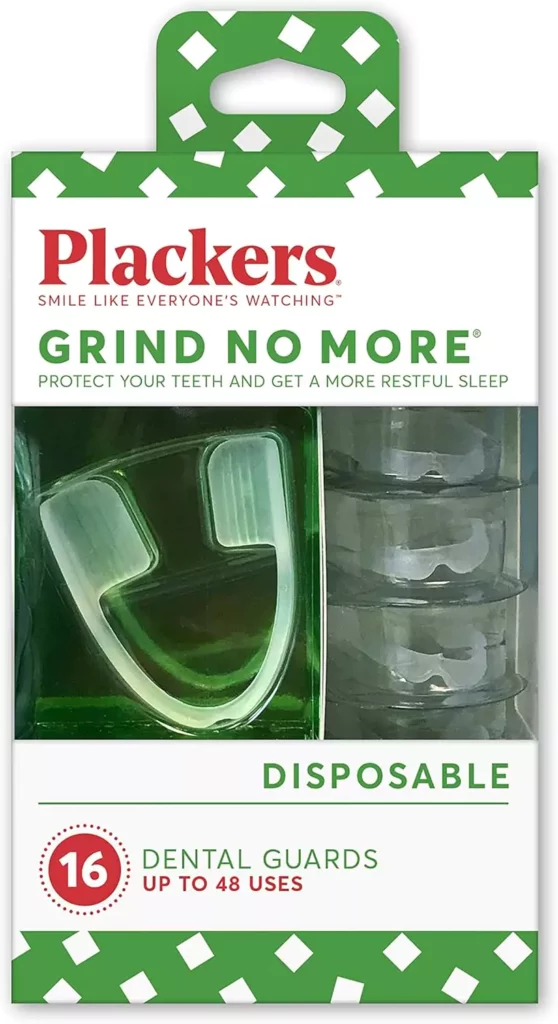
Grind No More: Featuring patented clench and grind absorbing bite plates to stop you from grinding your teeth during the night and to increase peaceful sleep.
4. DenTek Comfort-Fit
It is a partial guard for lower teeth, no boiling or molding needed. Adjusts with a flexible band.
How to use
- Remove from packaging.
- Place on the lower teeth and adjust with the band.
- Wear nightly as needed.
Pros
- extremely easy to use
- smaller, more discreet design
- comfortable for people who dislike large guards
- good for mild bruxism
Cons
- may loosen during sleep
- less protection, because it does not cover all teeth
- not suitable for moderate to severe bruxism
It is perfect if you want simplicity and comfort without hassle. Not recommended if you need full coverage or have moderate to severe bruxism.
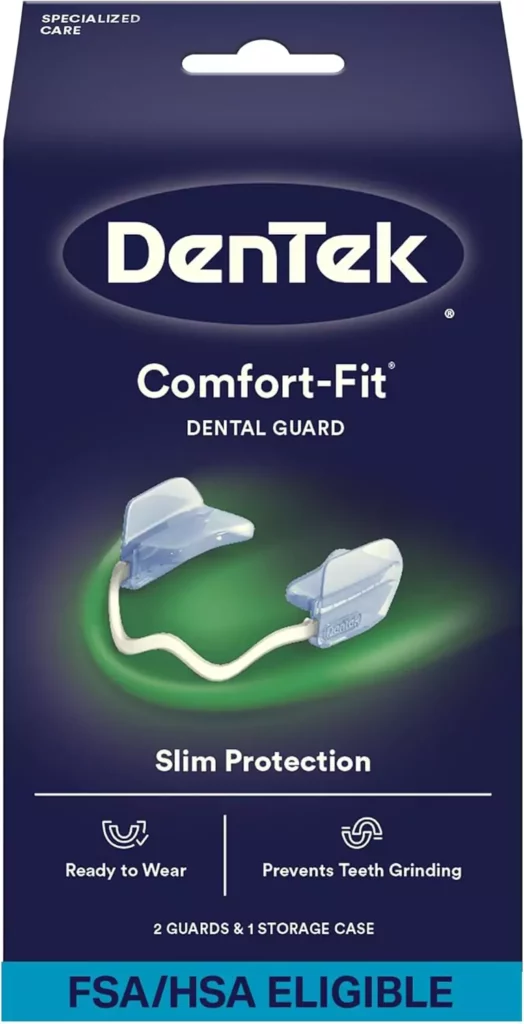
DenTek Comfort-Fit Dental Guards are ready-to-wear with a slim, secure fit on the lower teeth to provide the same level of protection as a full coverage dental guard.
How to choose the right mouthguard for teeth grinding?
Key factors to consider:
Grinding severity
- Mild: disposable or OTC guards are enough.
- Moderate: boil-and-bite or semi-custom guards are better.
- Severe: custom-made guards from your dentist are best
Comfort and fit
- Custom guards offer maximum comfort and a precise fit.
- OTC and boil-and-bite guards are a general fit and work well for many.
Price and durability
- Custom-made: over $100, lasts for years
- Boil-and-bite: $20–50, medium durability
- Disposable: under $25, last days to weeks
Consult your dentist
Especially important if you have jaw joint (TMJ) problems or dental issues, as an ill-fitting guard can worsen your bite or pain.
Investing in a quality mouthguard for teeth grinding protects your teeth, reduces jaw discomfort, and improves sleep.
Always evaluate your grinding level, comfort needs, and budget before choosing. Remember to talk to your dentist if you have doubts or severe bruxism to ensure that you choose the safest, most effective option for you.
Taking care of your oral health is an investment in your quality of life.
Frequently Asked Questions
Can I use a sports mouthguard for teeth grinding?
Why does my mouthguard feel uncomfortable or hurt?
Can I remold my boil-and-bite mouthguard?
Can wearing a mouthguard cause changes in my bite?
Can a mouthguard make teeth grinding worse?
Voice and Search (Q&A)
How do I clean my night guard for teeth grinding?
Rinse with water after using it, then brush it gently with a soft toothbrush and mild soap. Avoid toothpaste, as it can damage the plastic.
Why do I wake up with jaw pain even with a mouthguard?
Your mouthguard may not fit well, or your grinding is severe. Talk to your dentist to check if you need adjustments or a custom guard.
Why does my night guard smell bad?
If it smells bad, it might not be cleaned properly. Bacteria build up over time, so clean it daily and deep clean it weekly.
Share
References
1. Cleveland Clinic. (2023, January 10). Mouth guard. Cleveland Clinic. https://my.clevelandclinic.org/health/treatments/10910-mouthguards
2. Lal, S. J., Sankari, A., & Weber, K. K., DDS. (2024, May 1). Bruxism Management. StatPearls – NCBI Bookshelf. https://www.ncbi.nlm.nih.gov/books/NBK482466/
3. Marks, J. (2024, January 18). Do I need a dental health mouth guard? WebMD. https://www.webmd.com/oral-health/mouth-guards
4. NHS. (2025, June 20). Teeth grinding (bruxism). nhs.uk. https://www.nhs.uk/symptoms/teeth-grinding/
5. Riley, P., Glenny, A., Worthington, H. V., Jacobsen, E., Robertson, C., Durham, J., Davies, S., Petersen, H., & Boyers, D. (2020). Oral splints for temporomandibular disorder or bruxism: a systematic review. BDJ, 228(3), 191–197. https://doi.org/10.1038/s41415-020-1250-2
-
Dr. Yeidy Carolina Mesa [Author]
DDS Yeidy Carolina Mesa Passionate Dentist | Advocate for Accessible Oral Health Education Graduating from Universidad CES in 2022, I am a dedicated general dentist with a lifelong passion for helping others and making a meaningful impact in the world. My journey into dentistry began at the age of 7, inspired by my own experience with braces and overcoming a fear of the dentist. This personal journey shaped my mission to help patients conquer their own dental anxieties and embrace a healthier,...
View all posts
-
Nayibe Cubillos M. [Medical Reviewer]
Pharmaceutical Chemestry |Pharmaceutical Process Management | Pharmaceutical Care | Pharmaceutical Services Audit | Pharmaceutical Services Process Consulting | Content Project Manager | SEO Knowledge | Content Writer | Leadership | Scrum Master
View all posts
A healthcare writer with a solid background in pharmaceutical chemistry and a thorough understanding of Colombian regulatory processes and comprehensive sector management, she has significant experience coordinating and leading multidisciplina...Recent Posts


